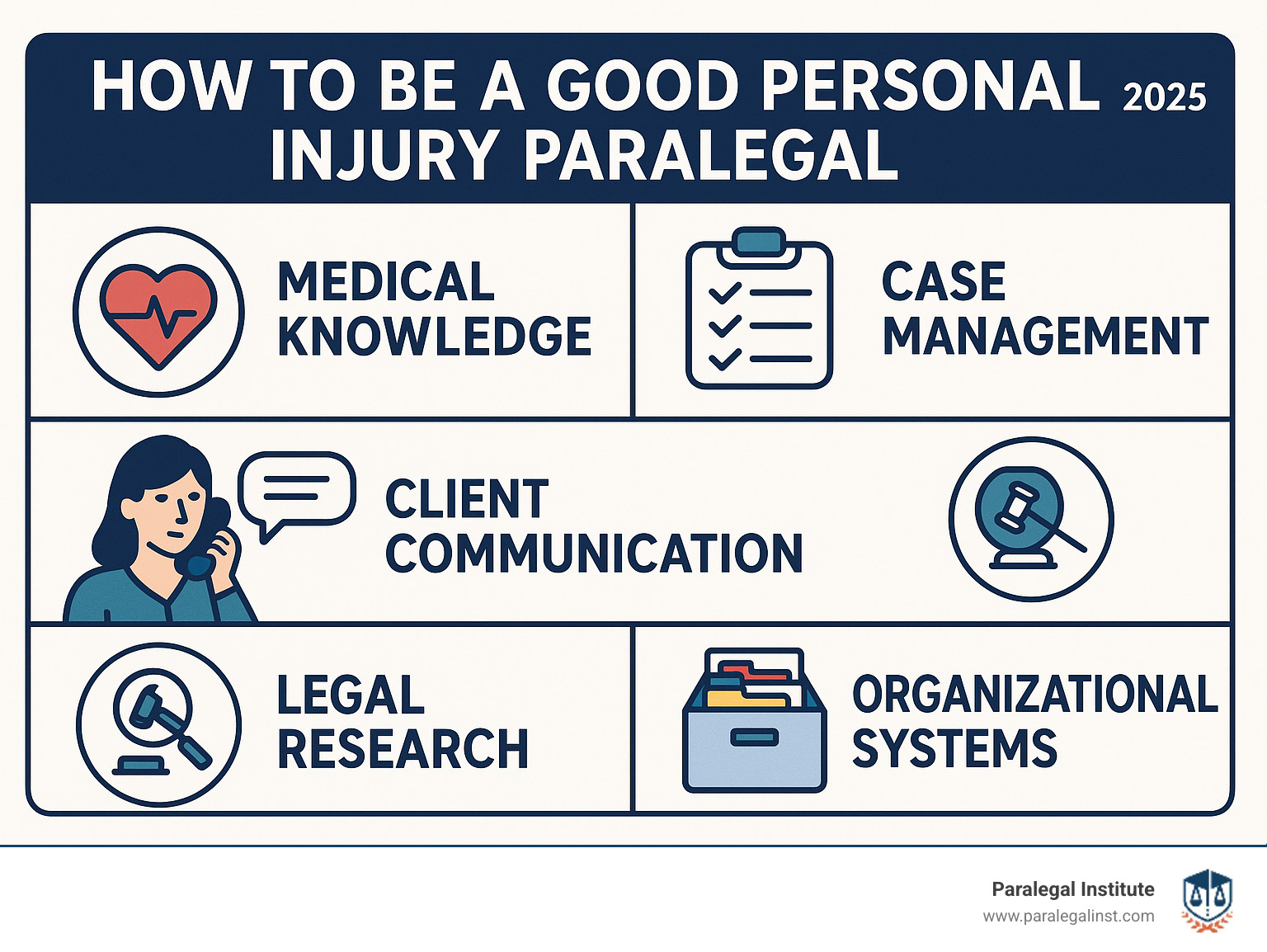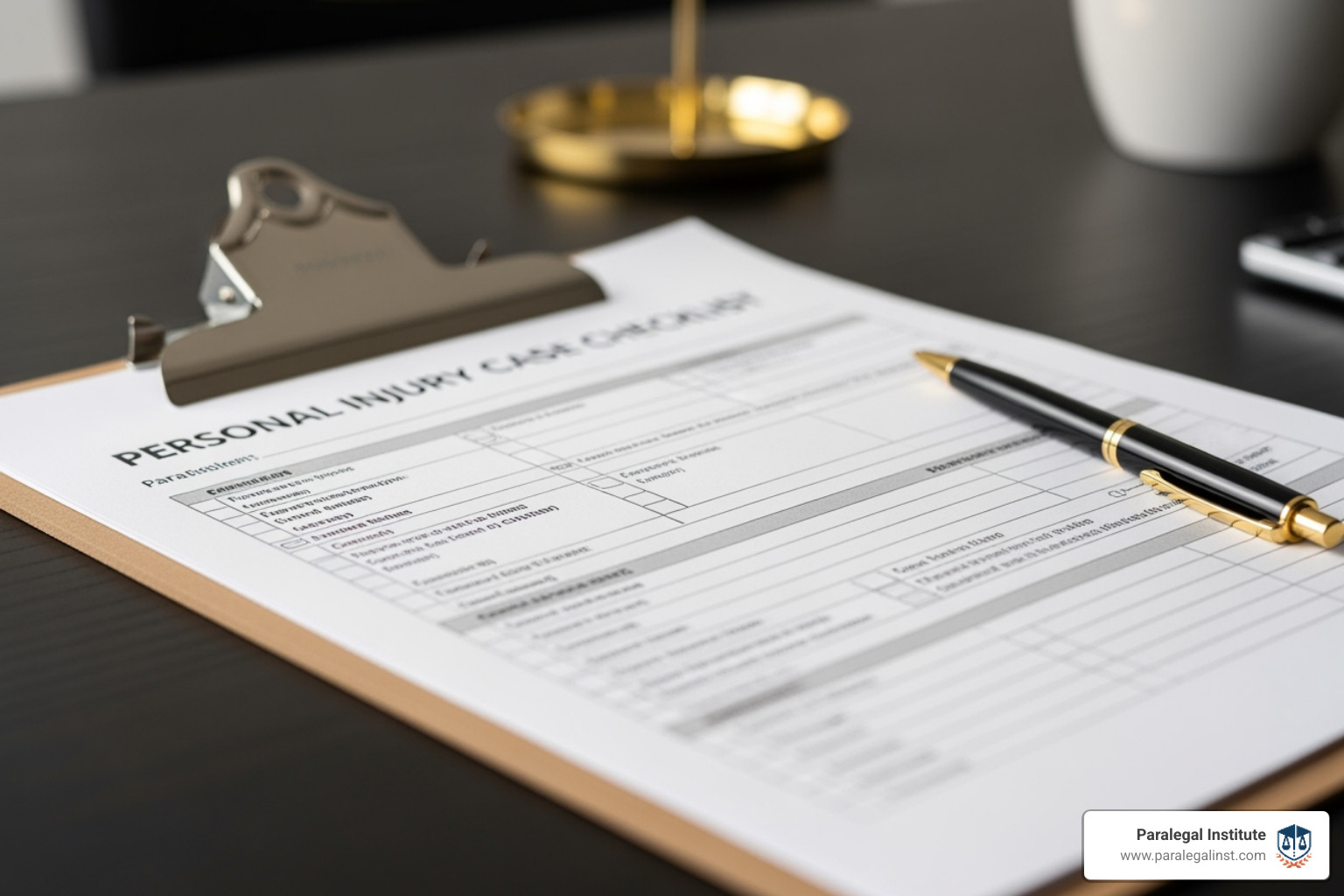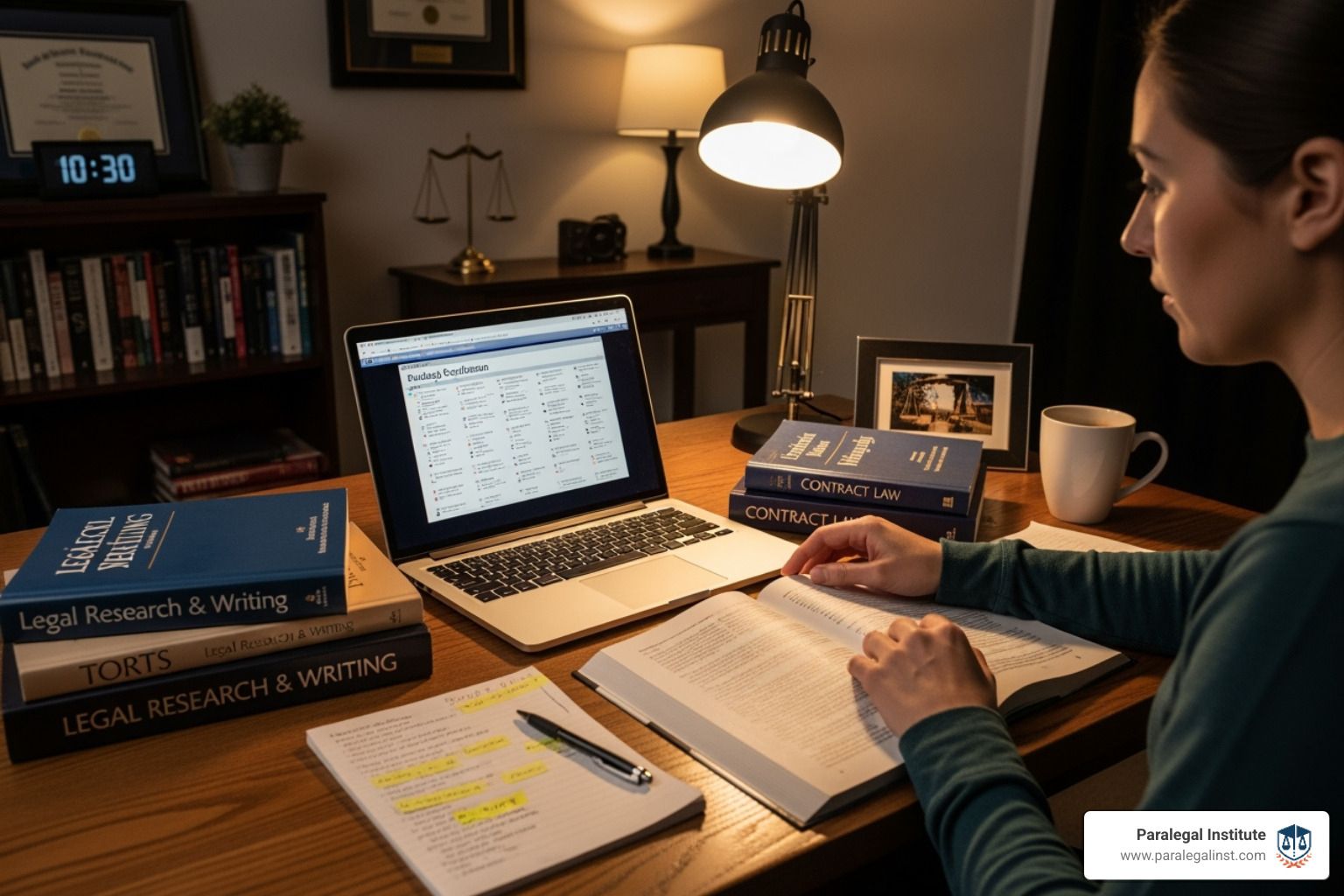Personal Injury Paralegal Mastery – Skills You Need to Succeed
Why Personal Injury Paralegals Are Essential to Legal Success
How to be a good personal injury paralegal requires mastering a unique blend of legal knowledge, medical understanding, and exceptional organizational skills. Personal injury paralegals serve as the backbone of law firms, managing everything from client intake to trial preparation while providing crucial support to attorneys handling complex cases.
Quick Answer: Key Skills for Personal Injury Paralegal Success
- Master medical knowledge- Learn anatomy, medical terminology, and how to read medical records
- Develop strong organization- Manage multiple cases, deadlines, and client communications effectively
- Build client rapport- Show empathy while maintaining professional boundaries with injured clients
- Understand the legal process- Know statutes of limitations, discovery procedures, and court filing requirements
- Create efficient systems- Use checklists, templates, and case management tools to stay organized
- Communicate clearly- Draft professional correspondence and maintain regular client contact
- Think proactively- Anticipate attorney needs and identify potential case issues early
As one experienced paralegal noted: "It may be more critical for the paralegal to know the medicine than the law" in personal injury cases, highlighting how this specialty requires skills beyond traditional legal work.
The role demands juggling upwards of 100 personal injury files while ensuring nothing falls through the cracks. Personal injury paralegals handle everything from ordering medical records and interviewing witnesses to preparing demand packages and supporting trial preparation. They serve as the primary point of contact for clients during some of the most difficult times in their lives.
I'm Matthew Pfau, and through my years of owning a personal injury law firm and hiring numerous paralegals, I've learned exactly what skills separate good paralegals from great ones. My experience training paralegals at the University of Nevada, Las Vegas has given me deep insight into how to be a good personal injury paralegal and build a successful career in this rewarding field.

The Backbone of the Firm: Core Roles and Daily Responsibilities
You know how every superhero team has that one person who keeps everything running behind the scenes? That's exactly what personal injury paralegals are for law firms! Paralegals are truly the backbone of any successful personal injury practice. Our work is essential, keeping cases moving forward smoothly and allowing attorneys to focus on the big-picture legal strategy.

A paralegal's daily tasks are incredibly diverse. Paralegals handle everything from detailed case management and meticulous document drafting to compassionate client communication and crucial evidence gathering. Plus, they are always on top of calendaring deadlines and, of course, providing invaluable support to attorneys. Whether the paralegal is working for individuals who've been injured (the plaintiff side) or defending a party (the defendant side), their role is paramount. It’s common for us to juggle a significant number of files—sometimes well over 100 personal injury cases—all at different stages! This is where a paralegal's understanding of how to be a good personal injury paralegal truly shines.
From Intake to Investigation
The journey with a new client usually begins at the intake stage. This is often the first time someone reaches out after a life-changing accident, so our approach is always warm and professional. Paralegals conduct initial client interviews, carefully gathering information about their accident and injuries. Paralegals also assess the case viability and check for any potential conflicts of interest. Paralegals make sure all the necessary paperwork, like a HIPAA authorization , is signed. This authorization is super important because it lets paralegals get those vital medical records!
After intake, paralegals dive into the investigation phase. Think of it like being a legal detective! We might order accident report reviews, conduct witness interviews, and even get scene photography of where the accident happened. The aralegal's goal is to collect all the facts and pieces of the story that will build a strong case for the client.
Managing the Case File
Once a case is open, it becomes the paralegals' baby. Paralegals are responsible for managing the huge amount of documentation that piles up. This includes promptly requesting medical records and diligently tracking medical bills from all the different healthcare providers involved. Paralegals also review police reports, witness statements, and insurance policies.
Organizing documents isn't just neatness; it's absolutely critical. Paralegals create detailed medical chronologies and narratives, summarizing the client's treatment history for the attorney. This makes sure paralegals can quickly find information and that nothing ever falls through the cracks. For brilliant tips on how to keep your workload under control, definitely check out our insights on strategies for staying organized.
Perhaps one of the most rewarding parts of this role is maintaining client contact. Paralegals keep clients updated on their case progress, answer their questions, and address their concerns. This consistent communication builds trust and helps clients feel supported during what is often a very difficult and emotional time.
Supporting the Litigation Process
As cases move forward, a paralegal's role often shifts to providing robust litigation support. This means paralegals get busy drafting pleadings, which are formal legal documents like complaints or answers. We also prepare and respond to discovery requests(like interrogatories and requests for production). Paralegals also masters at scheduling depositions, court hearings, and other proceedings, making sure everyone is on the same page. This includes making sure all court documents are filed correctly and on time.
When a case is headed to trial, a paralegal's involvement really intensifies! Paralegals help prepare exhibits, organize massive trial binders, and even assist in getting witnesses ready for depositions and testimony. A paralegal's meticulous attention to detail during this phase is absolutely critical. Paralegals know that sometimes, meeting tight deadlines means working a little late or on weekends. But it's worth it when you see the positive impact on a client's life.
From that very first client call to the final verdict, paralegals are deeply involved in every single step. A paralegals expertise ensures that law offices run smoothly, providing invaluable support to attorneys and helping clients steer the often-complex legal system. To truly understand our significant contributions, you might want to explore the vital role of paralegals in law firms.
The Essential Skillset: Combining Legal Acumen with Medical Insight
To truly excel as a personal injury paralegal, we need a special mix of skills. It's not just about knowing the law. It's about being good with technology, showing empathy, thinking critically, and solving problems. Paralegals act as a crucial link between the legal world and the medical world, helping attorneys and clients understand complex information.

Mastering Organization and Technology
Imagine juggling over 100 personal injury files all at once! That's why being super organized and great at time management isn't just a nice-to-have, it's a must. Paralegals break down big tasks into smaller, easier steps. This helps us prioritize what's most important, avoid last-minute stress, and really shows how to be a good personal injury paralegal. A good checklist? It's a paralegals best friend!
Paralegals lean heavily on technology to make our work flow smoothly. Tools like case management software and document management systems are like a paralegal's digital assistants. They help paralegals keep track of deadlines, store documents safely, and even automate repetitive tasks. Plus, paralegals are always creating and improving templates for common legal papers and letters. This saves tons of time and keeps everything consistent.
Being able to handle so many cases efficiently makes us truly essential to our law firms. Want to dive deeper into how being precise helps us every day? Check out our article on the importance of attention to detail.
Essential Tech Tools for Paralegals:
- Case Management Software: For tracking files, deadlines, and communications.
- Document Management Systems: For secure digital storage and quick retrieval of documents.
- Spreadsheet Software (like Microsoft Excel): Perfect for tracking expenses, medical bills, or creating detailed timelines.
- Presentation Software (like PowerPoint): Handy for preparing exhibits or trial presentations.
- Legal Research Platforms: Where we find relevant case law and statutes.
- Communication Tools: Email and instant messaging for staying in touch internally and externally.
- E-filing Systems: For submitting documents to courts electronically.
Developing Crucial Medical Knowledge
Here's a fun fact about personal injury paralegal work: sometimes, knowing medicine is even more important than knowing the law! We spend a lot of time poring over medical records. This means we need a solid grasp of basic anatomy, medical terminology, and common medical abbreviations.
Paralegals learn to understand what doctors write in their notes and grasp the details of different injuries. For example, knowing the difference between a fracture close to the body versus one farther away can really change a case's value. We also track how a client's treatment is progressing. Building a medical term cheat sheet is incredibly helpful, and paralegals often use resources like common medical abbreviations and explanations of conditions like radiculopathy. Paralegals soak up this knowledge from medical study guides, anatomy books, online videos, and by simply asking experienced colleagues. Paralegals medical smarts help guide attorneys on medical timelines, saving them precious time!
Honing Communication and Interpersonal Skills
A paralegal's job means we're constantly talking to clients, attorneys, doctors, and insurance adjusters. So, having top-notch communication and people skills is absolutely vital. This includes active listening, which is key when talking to clients who are often going through a tough time. Paralegals learn to be empathetic but also keep things professional. Paralegals offer support without getting overwhelmed ourselves.
Paralegals write professional letters and emails, making sure everything is clear and precise. Being able to talk effectively with insurance adjusters and medical providers helps us get records and information much faster. And of course, strong teamwork is essential. Paralegals work closely with attorneys and other legal staff to keep cases moving forward smoothly. For tips on making your writing even better, check out our guide on improving your legal writing skills.
How to Be a Good Personal Injury Paralegal: Education and Career Advancement
So, you're wondering how to be a good personal injury paralegal and truly shine in this rewarding field? Well, it's not just a job; it's a journey of continuous growth and learning! Becoming a top-notch personal injury paralegal means always staying proactive, embracing new knowledge, and strategically planning your career steps. We're always striving to become even more indispensable and valuable to our law firms. If you're curious about how we build the expertise to do just that, you'll want to check out our insights on building practical skills in your training.
The Foundation: Earning a Paralegal Certificate
The clearest and most effective way to start your journey as a personal injury paralegal is by earning a paralegal certificate. Think of it as your solid launching pad! At The Paralegal Institute, for example, our 15-week paralegal certificate program is designed to be super hands-on and . It's built by legal pros who know exactly what firms are looking for. Our goal is to equip you with practical skills so you can jump right into the workforce feeling confident and ready.
This isn't just about memorizing facts; it's about getting real-world ready. Our training dives into key legal topics like tort law fundamentals(that's the exciting part about personal injury cases!), civil procedure basics, and even important legal ethics. We don't just teach theory; we show you how to apply it in real, everyday legal situations. This kind of focused education truly gives us the strong foundation we need to steer all the ins and outs of complex personal injury cases. Curious for more? Find our approach to career-focused paralegal education.
How to be a good personal injury paralegal by specializing
After building that strong foundation, a fantastic way to become an even better personal injury paralegal is by specializing. Think of it like finding your superhero niche! Personal injury law is a huge field, so picking a specific area lets us really dig deep, become incredibly knowledgeable, and even be the firm's go-to expert.
For instance, you might specialize in medical malpractice(cases where healthcare professionals were negligent), workers' compensation(injuries happening on the job), product liability(when defective products cause harm), or even wrongful death cases(claims for those who've tragically passed due to someone else's negligence).
When we focus our skills, we open up a really detailed understanding of the unique laws, rules, and medical details that matter most in that specific niche. This deep expertise doesn't just make us more valuable to our firms; it also opens doors to more challenging, and often more rewarding, work!
How to be a good personal injury paralegal through career growth
A paralegal's careers as personal injury paralegals are truly dynamic, often growing as we take on more responsibilities and actively seek out new learning opportunities. One super practical step is becoming a notary public. This means a paralegal can notarize legal documents right in the office, which is a huge convenience for both the firm and clients.
As paralegals gather more experience and really show what they can do, exciting new roles open up! Paralegals can advance to become a senior paralegal or even a case manager. In these roles, paralegals might oversee other paralegals and take on a much more strategic part in managing cases. It's a paralegal's proactive approach and dedication to excellence that truly propel their careers forward.
Navigating the Demands: Challenges, Environment, and Rewards
Working as a personal injury paralegal is undoubtedly rewarding, but it comes with its own set of unique demands. Paralegals often find themselves balancing a high-pressure workload with the emotional weight of our clients' challenging circumstances. Understanding these aspects is key to a sustainable and fulfilling career.
Understanding the Work Environment and Earning Potential
Personal injury paralegals can find themselves in various work environments. Paralegals might work for plaintiff-side firms, which represent injured individuals, or defense-side firms, which represent insurance companies or defendants. Both offer unique experiences and perspectives on personal injury law.
The size of the law firm also plays a significant role. Small law firms often mean we handle a wider range of tasks and have more direct responsibility for cases from start to finish. In larger firms, our roles might be more specialized, focusing on specific stages of litigation or types of cases. Some paralegals even work within corporate legal departments that handle personal injury claims.
The demand for personal injury paralegals and legal assistants in the U.S. is consistently high. Earning potential can be significant and varies based on factors like geographic location, skill level, firm size, and years of experience. Those who excel in the field can achieve a very competitive salary. Most law firms seek candidates with at least one year of on-the-job work history, highlighting the value of practical experience. Our location in Las Vegas, NV, for example, is a growing legal market with opportunities for skilled paralegals.
Managing the Emotional Demands of Personal Injury Law
The "personal" in personal injury law means we often deal with clients who are experiencing significant pain, trauma, and financial hardship. Cases can involve serious injuries, wrongful death, or other deeply distressing circumstances. This requires a unique blend of compassion and emotional resilience.
Paralegals learn the art of compartmentalization—being empathetic listeners while simultaneously maintaining a clinical approach to the facts and evidence. It's about supporting clients through their emotional and financial recovery, but also protecting the paralegal's mental well-being. As one paralegal wisely put it, "My advice is to not take anything they say personally and just remind yourself they’re going through a very difficult time in their life and are struggling."
Despite these challenges, the personal fulfillment of helping people steer complex legal systems and achieve justice is immense. Paralegals gain a unique perspective on the legal industry, witnessing the challenges and triumphs of cases up close. This ability to make a tangible difference in people's lives is often cited as the most rewarding aspect of being a personal injury paralegal.
Frequently Asked Questions about Being a Personal Injury Paralegal
These are the questions we hear most often from people considering a career as a personal injury paralegal. Having worked in this field and trained countless paralegals, I can share honest insights about what this career path really entails.
How can I gain experience in personal injury law if I'm new to the field?
Starting fresh in personal injury law might feel daunting, but there are several practical ways to break into the field. The most effective approach is completing a hands-on paralegal certificate program that focuses on real-world skills rather than just theory.
At The Paralegal Institute, our 15-week program is designed specifically to prepare you for immediate workforce entry. We focus on the practical skills that law firms actually need, taught by practicing legal professionals who understand what works in the real world.
While you're studying or job hunting, highlight your transferable skills from previous roles. Did you work in customer service? That's client communication experience. Were you in healthcare? You already understand medical terminology. Worked in insurance? You know how claims processes work.
Networking is incredibly valuable in the legal field. Attend local bar association events, connect with legal professionals in your area, and don't be afraid to reach out to personal injury firms directly. Many are willing to provide informational interviews or shadowing opportunities.
Consider volunteering at legal aid organizations or seeking internships, even unpaid ones, to get your foot in the door. The hands-on experience you gain will be worth its weight in gold when you're interviewing for paid positions.
What makes a personal injury paralegal stand out to an attorney?
After years of hiring and training paralegals, I can tell you that proactive paralegals are worth their weight in gold. Attorneys don't want to micromanage—they want paralegals who anticipate needs, spot potential issues before they become problems, and handle routine tasks without constant supervision.
Medical knowledge is what separates good paralegals from great ones in personal injury law. When you can read medical records, understand injury terminology, and create comprehensive medical chronologies without needing everything explained, you become indispensable. You're not just organizing documents—you're helping build the medical foundation of the case.
Exceptional organization skills are non-negotiable. Attorneys need to trust that when they ask for something, you know exactly where it is and can provide it immediately. This means developing systems for tracking deadlines, managing documents, and maintaining consistent client communication.
Empathetic client communication sets outstanding paralegals apart. Clients often feel more comfortable talking to paralegals than attorneys, so being able to provide reassurance while gathering necessary information is crucial. You become the human face of the firm for many clients.
Finally, reliability under pressure is what makes attorneys truly value a paralegal. When deadlines are looming, cases are heating up, and stress levels are high, being the steady, dependable team member who gets things done correctly and on time makes you irreplaceable.
The paralegals who master these skills don't just survive in personal injury law—they thrive and build rewarding, well-compensated careers helping people during their most challenging times.
Conclusion
So, we've walked through what it truly takes to be an amazing personal injury paralegal. It's clear that mastering this role is a truly rewarding journey for anyone drawn to the legal world and passionate about helping people. You see, it's all about bringing together a unique mix of talents: a solid grasp of legal concepts, a surprising amount of medical know-how, top-notch organizational skills, and a warm, empathetic approach when working with clients.
Paralegals are the unsung heroes, the vital link between clients seeking justice and attorneys fighting for it. A paralegal's dedication to clients and the ability to provide essential, unwavering support to attorneys make a paralegal an absolutely indispensable members of any legal team. It's a challenging role, yes, but one where you genuinely make a difference every single day.
If this sounds like the fulfilling career path to success you've been searching for, then we have great news! At The Paralegal Institute, we're all about giving you the real-world practical training you need. Our accelerated, hands-on curriculum is designed by legal pros, meaning you'll learn exactly what you need to hit the ground running.
We truly believe that with the right training and a commitment to growing your skills, anyone can learn how to be a good personal injury paralegal and build a successful, impactful career. Ready to take that first exciting step? Start your journey with our Paralegal Certificate program and find the incredible impact you can make in the lives of others.











